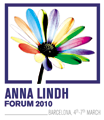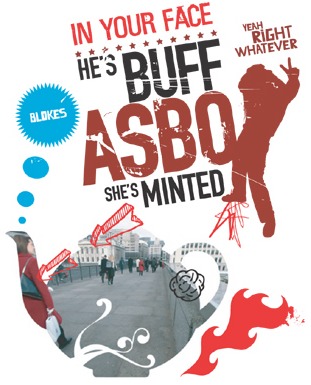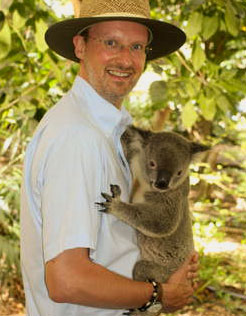 In this show I’ll be mainly reporting from the Anna Lindh Foundation forum which was held in Barcelona a couple of weeks ago. We’ll be hearing from a Moroccan about his experience of volunteering in Norway. We’ll also be hearing about how Cornelis Hulsman from the Netherlands found himself attracted to go and live in Egypt. I was making an Internet search challenge recently and included the question ‘How many podcasts about intercultural communication can you find?’ and although there are one or two one-off podcasts on the topic, it still seems that the answer is one and that is Absolutely Intercultural. What’s more this particular show marks our fourth birthday since it is four years, give or take a few days, since we first started.
In this show I’ll be mainly reporting from the Anna Lindh Foundation forum which was held in Barcelona a couple of weeks ago. We’ll be hearing from a Moroccan about his experience of volunteering in Norway. We’ll also be hearing about how Cornelis Hulsman from the Netherlands found himself attracted to go and live in Egypt. I was making an Internet search challenge recently and included the question ‘How many podcasts about intercultural communication can you find?’ and although there are one or two one-off podcasts on the topic, it still seems that the answer is one and that is Absolutely Intercultural. What’s more this particular show marks our fourth birthday since it is four years, give or take a few days, since we first started.
If I think about my identity as half French, half British and living in Denmark the conclusion I most often come to is that I see myself as European. I have even bought myself a dot eu internet domain so certain I am that Europe defines my identity! So when I was invited to the Anna Lindh Foundation forum in Barcelona last month to live blog that really meant a change in perspective for me since the focus of the Anna Lindh Foundation is a rapprochement between the countries of the Euro Med region. This translates as better mutual understanding between the mainly Arab Southern Mediterranean region and the Europeans on the northern shores of the Mediterranean sea.
absolutely musical
The Barcelona forum was a way for the Anna Lindh Foundation to find out what its priorities in the coming period should be. So we heard about a great many inspiring projects seeking to promote reconciliation and mutual understanding between former enemies. There were also many discussions about best practices and the priorities for the future. A recurring theme was about how to solve the Israeli-Palestinian conflict and there were inspiring stories about how the reconciliation process can be promoted from people in Northern Ireland and the Balkan countries. If the Israeli Palestinian problem seemed intractable then the musical interlude on the last night of the forum certainly gave one hope. The group, Aisikedes, of local musicians from Barcelona together with Omar Faruk played an eclectic mix from the shores of various Mediterranean countries including Greece and Israel.
absolutely secure
One shining example of a one man effort to bring North and South together was Rachad Izzat of Chantiers Sociaux Marocain an organisation which helps young Morrocans find voluntary work. Before working for the CSM Rachad was a volunteer himself in Denmark, Italy and Norway so I asked him about his Norwegian experience. I’ll be talking with Rachad about his current work in Morocco in a future podcast.
absolutely accurate
Another recurring theme during the forum was the issue of media reporting. There were many issues of concern including the quality of reporting, the threat or opportunity posed by the new media and online social networks, censorship and so on. And in fact the quality of media reporting is one major reason which led Cornelis Hulsman to go to Egypt where he founded the Centre for Intercultural Dialogue and Translation as well as well as the Center for Arab-West Understanding and the Electronic Network for Arab-West Understanding. Cornelis Hulsman, originally from the Netherlands is now based in Egypt. I asked him what had brought him to Egypt in the first place. Much of Hulsmans work is aimed at improving the quality of media reporting in the region so I also asked him why he thought this issue was so important.
absolutely Mediterranean
There will be more reports from the ALF Barcelona forum in future podcasts and you can of course find links to the people and organisations mentioned on this blog. And if you have a comment about the forum and whether such initiatives can do any good then please do leave us a comment. If you were at the forum and think your project should be featured here in the podcast then do get in touch. There were so many interesting projects and I could only be in one place at a time! And if you like the podcast then please do consider voting for us in the European Podcast Awards either under Germany or Denmark (or dare I say it – both). If you need help with the voting then you will find a page on this blog where we explain what to do.
absolutely foolish
Finally for this show I was speaking about this podcast to some graduates of teacher training courses at The Consultants-e and realised that this show would be coming out on April 2nd, the day after April Fool’s Day. In Britain, France and Denmark this is a day for playing tricks on people and I was interested to know how far this tradition extended. So listen as Bea from Argentina and Galina from Russia explain whether they have April Fool in their respective countries.
The next show will be coming to you on 16th April from Dr. Laurent Borgmann now back in Germany.
So long…stay tuned!
The host of this show is: Anne Fox
Editor: Dino Nogarole







 The drumming which starts the show was recorded when the Ghanaian drummers of
The drumming which starts the show was recorded when the Ghanaian drummers of  absolutely down-under
absolutely down-under